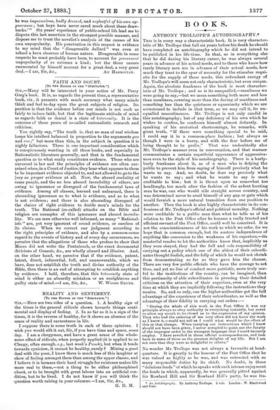FAITH AND DOUBT.
[To TEE EDITOR OF THE " EPIECTATOR.1 SIR,—Many will be interested in your notice of Mr. Percy Greg's book. It is, as regards the present time, a representative book, viz., it presents with much accuracy what many minds think and feel to-day upon the great subjects of religion. Its position is that the evidence before our minds is not such as fairly to induce faith, but that the legitimate attitude of mind as regards faith or denial is a state of betweenity. It is the outcome of these years of so-called rationalistic research and criticism.
You rightly say, "The truth is, that no man of real wisdom keeps his intellect balanced in proportion to the arguments pro and con r but more than this, in the subject in question it is nighly fallacious. There is one important consideration which is conspicuously wanting in all these books, and especially in Rationalistic literature generally, and that is the fundamental question as to what really constitutes evidence. Those who are unversed in law and the principles of evidence are often sur- prised when, in a Court of Justice, they hear what appears to them to be important evidence objected to, and not allowed to go to the jury as proper evidence at all. Now, the absurd credulity of some people, and the no less absurd incredulity of others, are owing to ignorance or disregard of the fundamental laws of evidence. Among all classes, learned and unlearned, there is abounding ignorance as to what is evidence, and as to what is not evidence ; and there is also abounding disregard of the claims of right evidence to decide men's minds for the truth. The Rational (so-called) attacks on the Bible and religion are examples of this ignorance and absurd incredu- lity. We see men otherwise well informed, as many " Rational- ists " are, yet very ignorant of sound evidence, or careless of its claims. When we correct our judgment according to the right principles of evidence, and also by a common-sense regard to the events of history and of every-day occurrences, we perceive that the allegations of those who profess to show that Moses did not write the Pentateuch, or the exact documental -divisions of Genesis, &c., are wholly absurd and illusive. And, on the other hand, we perceive that if the evidence, patent, latent, direct, inferential, full, and unanswerable, which we -have, does not establish the truth and divine authority of the Bible, then there is an end of attempting to establish anything 'by evidence. I hold, therefore, that this betweenity state of mind is either an absurdly mistaken or an unrighteous and
guilty state of mind.—I am, Sir, &c., W. WOODS SMYTH.


































 Previous page
Previous page